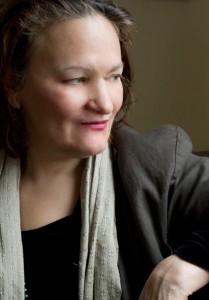Justin’s Japan: Interview with Filmmaker Amy Guggenheim on ‘When Night Turns to Day’
By JQ magazine’s Justin Tedaldi (CIR Kobe-shi, 2001-02) for Examiner.com. Visit his NY Japanese Culture page here to subscribe for free alerts on newly published stories.
New York-based writer/director/producer Amy Guggenheim is currently hard at work on When Night Turns to Day, a dramatic feature that will be shot in New York and Tokyo. A present-day romantic thriller with martial arts, sword choreography and tattoos, the film follows May, a young American female writer who gets drawn into both Japanese sword fighting (kendo) and a passionate relationship with Toshi, a young Japanese martial artist. Beyond anything she’d ever imagined, both must face secrets from their past, barely escaping with their lives.
Guggenheim herself is a third dan (degree) kendo practitioner who has competed in Tokyo, a grant recipient from the New York State Council on the Arts and the Mellon Fund, and the director of her own production company. I caught up with her to learn more about When Night Turns to Day, which begins shooting in Japan next year.
What made you interested in making a movie about kendo from an American perspective?
I got interested in making a film involving kendo after making a multimedia theater piece called Monsters and Marvels with video projection and 14 actors. It’s about the unconscious influence we have on each other from various cultures, Japanese being one of them. It’s also a way to express my vision of kendo as an American woman in 2010, interested in the “art” aspect of the “martial art.”
What is your personal history with Japan?
I’ve been involved with Japan in one way or another since the 7th grade. I was first interested in the design culture and the values of simplicity and essence, then later in kabuki, noh and butoh. In my background in theater, I was trained by Zen-influenced artists including Elaine Summers— an early intermedia artist from Judson Church (John Cage, Merce Cunningham, etc.), and then Eiko and Koma—butoh artists based in New York. When I was doing my own solo theater performance work, I started practicing kendo. For a few years I toured in Europe, Latin America and the U.S. performing my work and then practicing kendo with local dojos.
With the honor of having an Asian Cultural Council Grant in 2008, I was able to travel again to Japan (the first two trips were kendo-related—2006 participating in the first International Women’s Kendo Tournament in Tokyo), and in these last two years I’ve gone back several times and have been working with Masaru Koibuichi of Koi Pictures (our co-producer there), Setsu Asakura (art director) and others.
The dark, erotic tension of Japanese culture is my own language as well, and also the intuitive intelligence at the heart of kendo is my subject, too.
How did you get into kendo originally? Are there any films that cover the subject that inspired you with the idea or development of your film?
Bobby Troka, a kendo player and voice coach, worked with me on a solo piece of mine, suggesting I try it. I thought it was “too formal,” but once I did it, I fell in love with it and couldn’t stop! That was in 1990. There’s surprisingly few films that adequately deal with kendo, and I must say the idea developed out of my own experience and imagination and was inspired by people I met in the kendo world along the way. The way Kwaidan, directed by Masaki Kobayashi, deals with the uncertain spaces of the psyche, is evocative. Kurosawa’s Ran, Dreams and The Seven Samurai, Shindo’s Onibaba, Masumura’s Irezumi and Hong Kong martial arts films also have great inspirational material.
What are your current goals regarding the next steps in getting the film made?
We are assembling a terrific, experienced, creative team here and in Japan, and launched a mini-fundraising campaign going with Kickstarter.com that ran through November. We will next move on to preliminary test shooting and start working with sword choreographer Kataoka Noboru and actors in New York City. We are working hard to complete financing for the feature to shoot next fall, which will include investors, pre-sales and sponsors. If people are interested in donating to the project to help get us to principal photography next year, please go to our website at www.whennightturnstoday.com. You can also contact me by e-mail about donations, the project, or interest in getting involved with creative skills or production.
Click here for the rest of the interview.



Comments are closed.